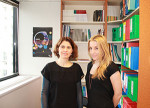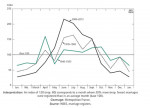
Gwennaëlle Brilhault and Amandine Morisset
Gwennaëlle Brilhault, head of INED’s Surveys Department, and Amandine Morisset, in charge of listing INED surveys and making them available to users, answer our questions on consulting surveys and data

Gwennaëlle Brilhault, head of INED’s Surveys Department, and Amandine Morisset, in charge of listing INED surveys and making them available to users, answer our questions on consulting surveys and data

For the 70th anniversary of its founding, the journal Population has been republishing articles from its 1946 issues, each commented upon by present-day researchers.

INED researcher Léonard Moulin tells us about his doctoral thesis on the effects on higher education students of introducing tuition fees. His work has received several awards, including the 2017 Prix Eicher this January.

Mortality fell considerably in the 20th century in western countries, but the decrease was neither regular nor continuous.

INED’s researcher tells us about the book "A dictionary of conventions"

Valeria Solesin, one of the persons killed in the 13 November 2015 attacks in Paris, was trained as a sociologist and demographer. At the time of her death she was in the last phase of completing her doctoral thesis on contemporary fertility behaviours in Italy and France, with a special focus on the transition from first to second child. The ...

The French population has continued to become more secularized over the last several decades: nearly half of French people state they have no religion. Catholicism remains the country’s first religion but the number of believers continues to fall. In a context where religion’s hold continues to weaken, a situation reinforced by the French policy framework of “laïcité”, how do immigrants ...

tells us about intergenerational family co-residency

The latest French national data enable us to track a representative sample of students from the equivalent of the first year of middle school through the baccalauréat, France’s nationwide upper secondary school leaving examination. They show that in 2005, 87% of teachers’ children obtained the upper secondary degree as against only 39% of children of unskilled manual workers. On the ...

Studies of the educational trajectories of immigrants’ children reach the same conclusion: a greater proportion of this group experience difficulties than native students, and from the very start of primary school, as attested by performance and study orientations.